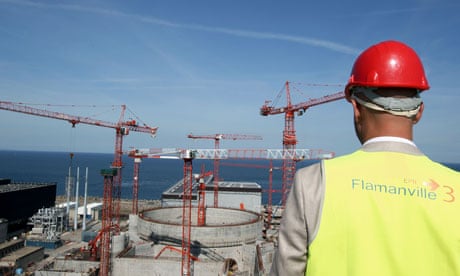Time is money, they say, and the new nuclear power plant being built by EDF at Flamanville in France is now at least four years behind time and €2.7bn over budget. EDF blamed the delay on two fatal construction accidents and dealing with safety analyses prompted by the Fukushima disaster.
So what does the news mean for the role for nuclear power in delivering the low-carbon electricity essential to tackling climate change? The three 'Cs' of energy policy are carbon, cost and continuity of supply, and Wednesday's announcement by EDF is relevant to the latter two.
The Flamanville fiasco shows once again that new nuclear power plants are not being built on time or on budget, diminishing the arguments in favour of them.
The only other new nuclear plant being built in Europe is at Olkiluoto in Finland. Areva, like EDF a state-controlled French company, told me this will be connected to the grid no sooner than 2013 and costs are now estimated at €5.6bn. That is four years late and €2.6bn over budget.
I wanted to understand better the effect of the delay and ballooning costs at Flamanville 3 on the ultimate cost of the electricity produced, and Jim Watson, professor of energy policy at the university of Sussex, kindly agreed to help.
The details of his working are at the end, but the summary is that the cost per kilowatt hour has jumped between about 33% and 45% in the last few years. Watson notes that the cost is particularly sensitive to delays, as this widens the gap between the heavy capital outlay and the point at which money starts to flow back in. The UK's committee on climate change estimates nuclear power as the cheapest low carbon source, but budget busting comparable to that at Flamanville would make it the same, or higher, than wind power.
So, the construction of nuclear is stalling and the costs are rising. Contrast that with renewable energy, where installations are surging, and most of the technologies are coming down in price as they mature and reach scale.
In the UK, the government has bet heavily on nuclear to keep the lights on at a cost we can bear, while cutting carbon emissions. The plan is to build eight new plants, with EDF's reactors operational by 2018.
But EDF has already said "we will publish an adjusted timetable in the autumn [to] take account of the final [Fukushima] report from the UK's Chief Nuclear Inspector and the lessons we are learning from experiences and challenges at our new build projects." I'd bet my house the adjustment will not be to an earlier date.
As I have said before, assessing what role nuclear power should have can only be done by making judgement calls on a range of key factors. Numbers are important but only get you part of the way, as there are too many uncertainties to be able to calculate your way to a definitive answer.
So do you believe EDF when it says: "Nuclear power in the UK [is] the lowest cost large scale form of low carbon electricity generation, and it can be delivered in time to meet this country's needs."
If you do, you have more reason to back nuclear. But, based on track record, I don't believe them. Taking this and other factors, such as safety, into account, I see no place for nuclear power in the UK's future energy mix.
Professor Watson's calculation: "First, I have assumed the Flamanville capital costs, a lifetime (the number of years to pay off the capital) of 30 years, a high load factor (the percentage of the time the station will operate) of 85%, a discount rate of 10% (which is what the UK's Committee on Climate Change uses) and a construction period of five years. That ends up with a rough generation cost of 8p per kWh. This is in the middle of the CCC range in their Renewable Energy Review (5p to 10p/kWh).
"Second, I have varied these assumptions. I have shortened the repayment lifetime to 20 years, and increased the discount rate to 12% - which are both closer to the criteria used in recent years by investors in the UK. Then the figure rises to 11p/kWh.
"If you assume the same conditions as in the first case above, but put in an earlier construction cost estimate of €4bn, you get a cost of electricity of between 5.5p and 6p/kWh instead. [Hence, the price has risen 33-45%]
"Under both these scenarios, a significant delay in construction such as that being experienced at Flamanville would push costs up further because of a longer wait before the plant starts earning any money."
Note: The CCC estimates the cost of nuclear at 7p/kWh (p256), including decommissioning costs, unlike Watson's calculations. But the CCC figure excludes "some additional costs [that] may be incurred for the first few nuclear plants in the UK." It estimates onshore wind at 9p/kWh and offshore at 10-13p/kWh.

Comments (…)
Sign in or create your Guardian account to join the discussion